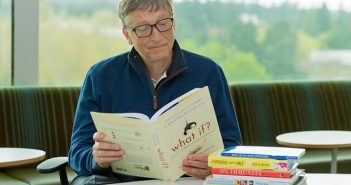
To help make 2017 a prosperous year, we've highlighted 12 of our favorite personal-finance books — one for each month — from century-old classics to hot new releases.
No guarantees you'll get rich, but it can't hurt to kick off the new year with one of these gems.
Kathleen Elkins contributed to a previous version of this article.
'Think and Grow Rich' by Napoleon Hill

Prompted by legendary businessman Andrew Carnegie, who turned a few nickels and dimes into a fortune, journalist Napoleon Hill researched more than 500 self-made millionaires over 20 years before releasing his 1937 best-seller "Think and Grow Rich."
He boils down the "secret" to building wealth into 13 principles and reveals "major causes of failure" that hold many of us back from getting rich.
There is no mention of "money," "wealth," "finances," or "stocks" within Hill's text. He takes a different approach, focusing on breaking down the psychological barriers that prevent many of us from attaining our own fortunes.
FIND IT HERE »
'Tools of Titans: The Tactics, Routines, and Habits of Billionaires, Icons, and World-Class Performers' by Timothy Ferriss
Author Tim Ferriss of "The 4-Hour Workweek" fame is back with "Tools of Titans," a new book packed full of the secrets to success he's gleaned from experts and applied to his own life.
The book distills Ferriss' favorite lessons from more than 200 interviews he's conducted with a wide range of highly successful people, ranging from Navy SEALs to billionaire entrepreneurs.
What better way to get rich than to study and replicate the habits of those who have already done it?
FIND IT HERE »
'The Total Money Makeover: A Proven Plan for Financial Fitness' by Dave Ramsey

If you're looking for a true financial tune-up, financial guru Dave Ramsey's best-seller will do the trick. Ramsey doesn't shower his readers with quick fixes in "The Total Money Makeover." He provides a bold approach to finance matters and gets to the bottom of money problems: you.
Along the way, he debunks many money myths and attacks the idea of the American Dream.
Several success stories back up Ramsey's simple, no-nonsense approach, including a couple who paid off $110,000 of debt in two years and a family that got into $109,000 of credit-card debt while earning six figures ... and then paid it off in four years.
FIND IT HERE »
'The Index Card: Why Personal Finance Doesn't Have to Be Complicated' by Helaine Olen and Harold Pollack

University of Chicago professor Harold Pollack made a splash in 2013 when he offhandedly noted during an interview with financial journalist Helaine Olen that the correct financial advice for most people can fit on a 3-by-5-inch index card.
Pollack then posted a photograph of the index card on his blog and things quickly went viral.
His point was that personal finance doesn't have to be complicated. In "The Index Card," he teams up with Olen to explain the 10 simple rules of the index card and why they outperform the complicated financial strategies out there.
FIND IT HERE »
'The Little Book of Common Sense Investing' by John C. Bogle

One of the most effective ways to get rich is to invest.
If you're not sure where to start when it comes to investing, pick up a copy of John Bogle's "The Little Book of Common Sense Investing." Endorsed by Warren Buffett, the quick read outlines smart investing strategies and tells you specifically how to use index funds to build wealth.
Bogle, founder of the Vanguard Group and creator of the world's first index fund, explains why these relatively straightforward vehicles can be so effective — and warns against investment fads and fashions.
FIND IT HERE »
'The Automatic Millionaire: A Powerful One-Step Plan to Live and Finish Rich' by David Bach

We all want to know the secret to getting rich — the one thing we can do to become a millionaire. In "The Automatic Millionaire," David Bach reveals his take on that enticing secret.
The best-selling author starts with the story of an average American couple who managed to own two debt-free homes, send two kids to college, and retire at 55 with over $1 million in savings. But you'll have to read to find out how they did it.
Even if you've read "The Automatic Millionaire" before, it's worth a revisit — Bach released an expanded and updated version of the classic in December.
FIND IT HERE »
'How Rich People Think' by Steve Siebold

Steve Siebold spent 30 years interviewing over 1,200 millionaires and billionaires to figure out what it is exactly that they're doing right.
"Everyone has the same opportunity to acquire wealth," he wrote on Business Insider.
"How Rich People Think" provides insights into becoming wealthy, broken down into bite-size chapters perfect for reading on the subway or over lunch. In it, Siebold recommends further reading and concrete action steps to help ambitious young people build their own wealth.
FIND IT HERE »
'Rich Dad, Poor Dad: What the Rich Teach Their Kids About Money That the Poor and Middle Class Do Not!' by Robert Kiyosaki

Multimillionaire Robert Kiyosaki tells the story of two dads — his own, and the father of his best friend — in his personal-finance classic "Rich Dad, Poor Dad."
His definition of wealth places significantly more weight on the money you have saved for tomorrow — whether for retirement, emergencies, or major events and purchases — than the money you have available to spend today.
His philosophy worked for "Shark Tank" investor Daymond John, who said the book changed his life.
FIND IT HERE »
'The Richest Man in Babylon' by George S. Clason

George S. Clason's timeless 1926 classic simplifies everything you need to know about personal finance. He articulates the steps to get rich through a collection of amusing parables based in the wealthiest city of the ancient world: Babylon.
The "secret" to getting rich is not much of a secret at all, Clason preaches throughout "The Richest Man in Babylon." All it takes is the ability to grasp a few simple — yet highly effective — concepts, such as paying yourself first, living below your means, and investing in yourself.
FIND IT HERE »
'Rich Habits: The Daily Success Habits of Wealthy Individuals' by Thomas Corley

Author Thomas Corley spent five years studying the lives of rich and poor people and managed to segment out what he calls "rich habits" and "poverty habits," meaning the tendencies of those who fit in each group. In "Rich Habits," he outlines his findings.
Dedicate 2017 to developing Corley's "rich habits." If something as simple as regular exercise or calling friends on their birthdays can increase your chances of attaining wealth, what have you got to lose?
FIND IT HERE »
'Own It: The Power of Women at Work' by Sallie Krawcheck

If there's one thing former Wall Street executive Sallie Krawcheck believes in, it's the power of investing — and that goes for women in particular.
In "Own It: The Power of Women at Work," Krawcheck explores the myths that surround women and money and breaks down practical ways every woman can elevate both her career and her financial know-how.
Krawcheck's book won't be released until January 17, but based on the insight she's already shared on everything from financial feminism to the mistakes women make at work, "Own It" is bound to be a must-read.
FIND IT HERE »
'The Behavior Gap: Simple Ways to Stop Doing Dumb Things with Money' by Carl Richards

Often it's the little mistakes that add up and prevent many of us from building wealth.
In "The Behavior Gap," financial planner Carl Richards focuses on the silly mistakes people make over and over — spending money they don't have, buying high because everyone else is, buying things that aren't meaningful — and explains how our natural instincts lead us astray even when we know what we should be doing instead.
Using simple, funny situations anyone can relate to, Richards also offers easy tips and suggestions on how to break these instinctual bad money habits.




